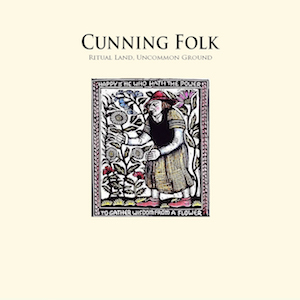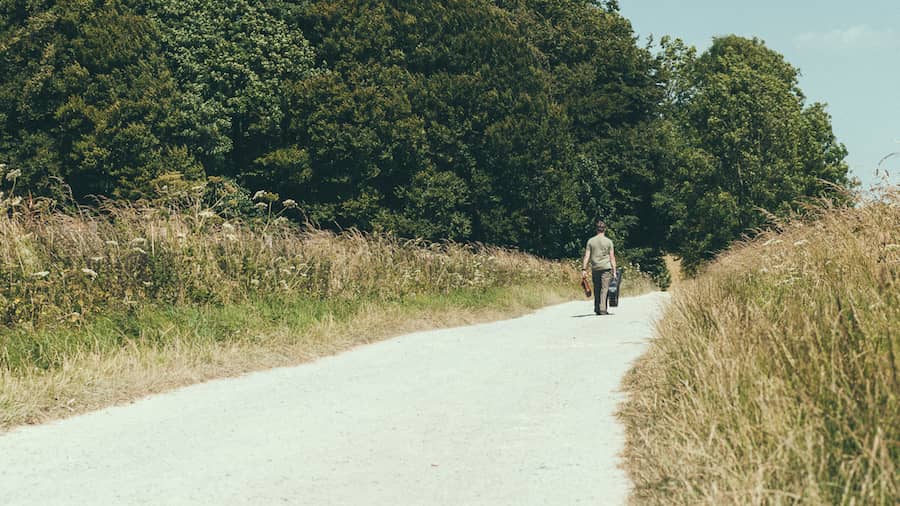 Cunning Folk – Ritual Land, Uncommon Ground
Cunning Folk – Ritual Land, Uncommon Ground
Dharma Records – Out Now
George Nigel Hoyle is more than just a folk singer. Sure, he has an illustrious history in London’s music scene both as Nigel Of Bermondsey and as the leading light behind GentleFolk, channelling the mysteries of English woodlands through the pubs and the patter of South East London. But there is another side to Hoyle. Despite the seemingly off-the-cuff nature of some of his recordings, he has long been a careful and thorough chronicler of Britain’s ritual past, its ancient psychogeography. His extensive, well-researched and beautifully presented blog is a welcome window into a world of witch trials, ancient agricultural practices and mysterious chalk figures.
Now, as Cunning Folk, he has turned those glimpses of antiquity into Ritual Land, Uncommon Ground, an album of stunning songs, each one something of a story in its own right. This first thing to know is that this is not just an album about individual rituals, it is a piece of art and a piece of research exploring the nature of ritual as a whole. The second noteworthy thing – and this becomes apparent after only a few seconds of the first track – is that this is in no way a traditional folk album.
That opening piece, fittingly titled This Is How It Starts, is an oddity. It doesn’t pitch the listener straight into the great outdoors, on some mission of archaeological or spiritual discovery. Instead, it sees Hoyle at his kitchen table, drinking his morning coffee and listening to Radio 4. As rituals go, this is one of the most personal and individual you are likely to hear rendered in music. And the surprise doesn’t stop with the concept. Where perhaps you would expect something resembling birdsong or influenced by the ancient pagan music of these isles, what you get instead is, while nonetheless pretty and pastoral, more akin to American country-pop, not unlike the quieter moments of early Big Star. As album openers go, it’s a bit of a curveball, but a very effective one.
The second track, though, submerges us right in the centre of the uncanny prehistoric landscapes of ancient Britain. Inspired by Alfred Watkins, the Herefordshire antiquarian who came up with the idea of ley lines in the 1920s, The Old Straight Track unfolds gently. Hoyle’s high, almost ethereal voice seems to emerge like a vapour from the deserted earthworks and brooding monuments, mingling with those of his bandmates while the wisp of an acoustic guitar line anchors the song.
The Modern Antiquarian is a more straightforward tribute to Julian Cope. Cope makes for a worthy subject. He is a true one-off: learned, unruly, visionary, a bit bonkers. Hoyle’s songwriting skills do justice to all of these facets, and his lyrics suggest that there is yet more of interest to be discovered ‘in this land of promises’. It is the sound of one enquiring mind sparking off against another.
In a way, listening to some of these songs is like exploring an unknown, eldritch landscape. You are never quite sure of your footing. What Has Been And Gone Before kicks off in almost reassuring weird folk territory, a la Dr Strangely Strange or The Incredible String Band, before the chorus hits and Hoyle gives free rein to his pop sensibilities. But this belies the depth of a song whose story examines the ambivalence of the relationship between Christian and pagan traditions, and at a deeper level still, the interconnectedness of spiritual and physical histories.
Chalk Horses is a country-folk stomp complete with barrelhouse piano. The most lighthearted moment of the album, it sounds like the fruits of an unlikely but productive meeting between Robyn Hitchcock and The Band. But even here the levity conceals a mystery: the chalk hill figures of the title are often of unknown origin, and it is this sense of the unrevealed or the secret that gives these locations much of their power. Hoyle is acutely aware of this and it translates wonderfully into his music.
But this is not an album concerned wholly with the past. Cunning Folk is attuned to the current political climate in ways that may only become clear with repeated listening. On Uncommon Ground he celebrates Britain’s island heritage, singing ‘it’s only natural to want to be an islander’, but at the same time warning of the dangers of insularity, of patriotism wrongly focused. Pride in one’s country is worthless unless it can be shared and enjoyed by other cultures and individuals, he seems to be saying. For a song ostensibly about history, it has a progressive message and a hopeful one. Lancashire, God’s Country also uses lessons from history to make pertinent points about tolerance and inclusiveness. Here the Pendle Witch trials are the grisly, haunting and downright sad backdrop. The song’s accompanying video is a thing of simple beauty, a black and white animation inspired by seventeenth-century woodcuts.
The idea of using the past to not only illustrate the future but positively impact it is most fully realised on the excellent A Brief History Of Agriculture And Mining, an object lesson in not forgetting where we came from. It ends with a wild and windswept instrumental section which hints at a return to some kind of state of nature. Elsewhere, the gently psychedelic drone that begins The Chime Child paves the way for an enigmatic, unsettling tale of a preternatural birth, while The Song Of The Nidge references the call of the yellowhammer and the zones of the shipping forecast in a way that is as soulful as it is folky. Finally, Walk Through Juniper is a simple love song to a topographical location, but as with everything Hoyle writes and sings, it is loaded with extra meaning. Here he is urging us to reconnect with our wild environments, our mysterious histories before they are entirely obliterated. His tone, as it is throughout, is persuasive and wise, without being didactic.
Ritual Land, Uncommon Ground is a quietly huge endeavour, a labour of love, full of valuable knowledge, surprising stylistic breadth and exquisite songwriting.
Ritual Land, Uncommon Ground is out now on Dharma Records
Available via ProperMusic
Connect with Cunning Folk: Website & Blog | Twitter | Facebook


